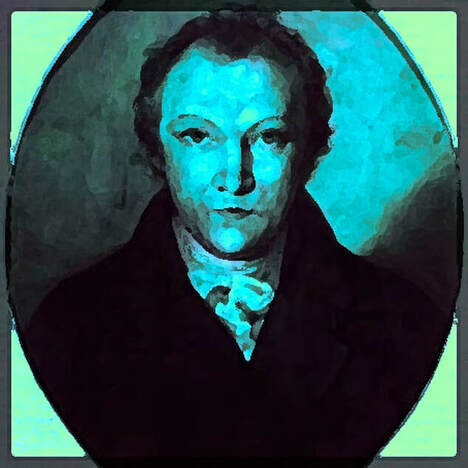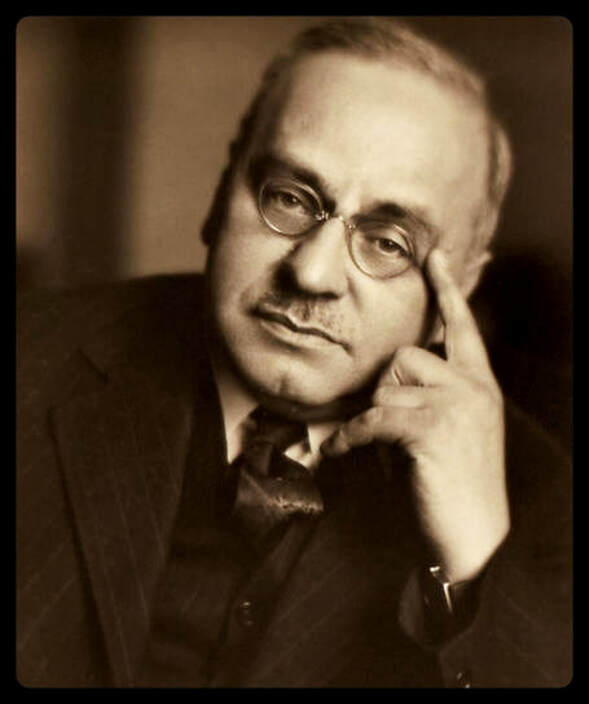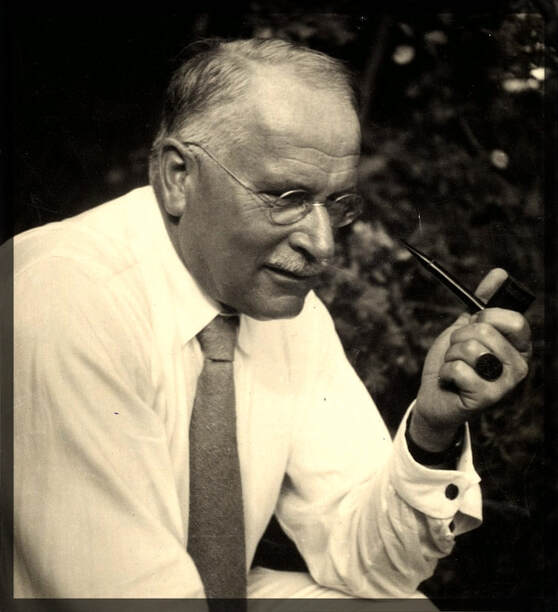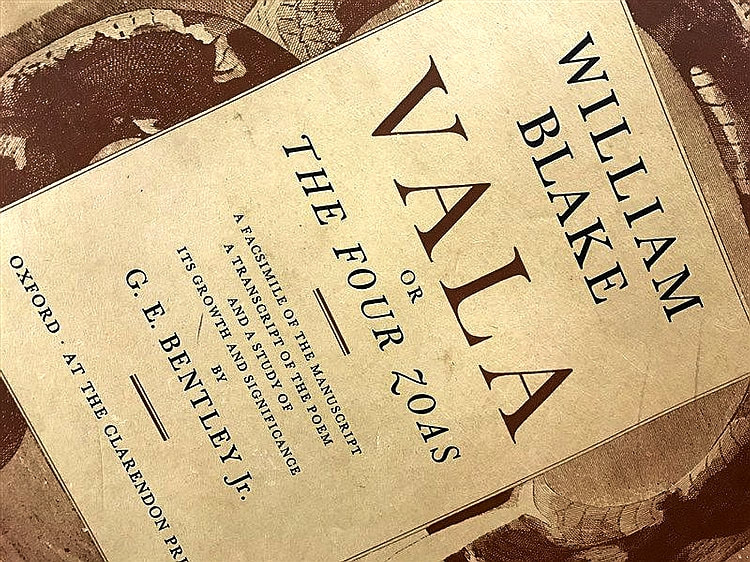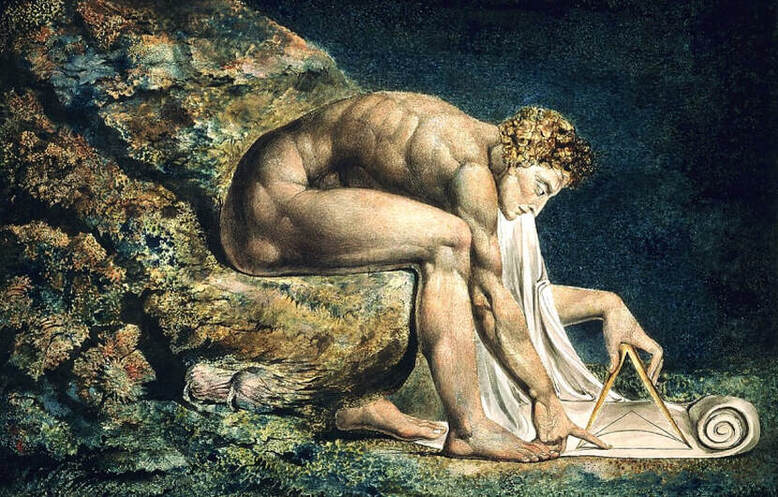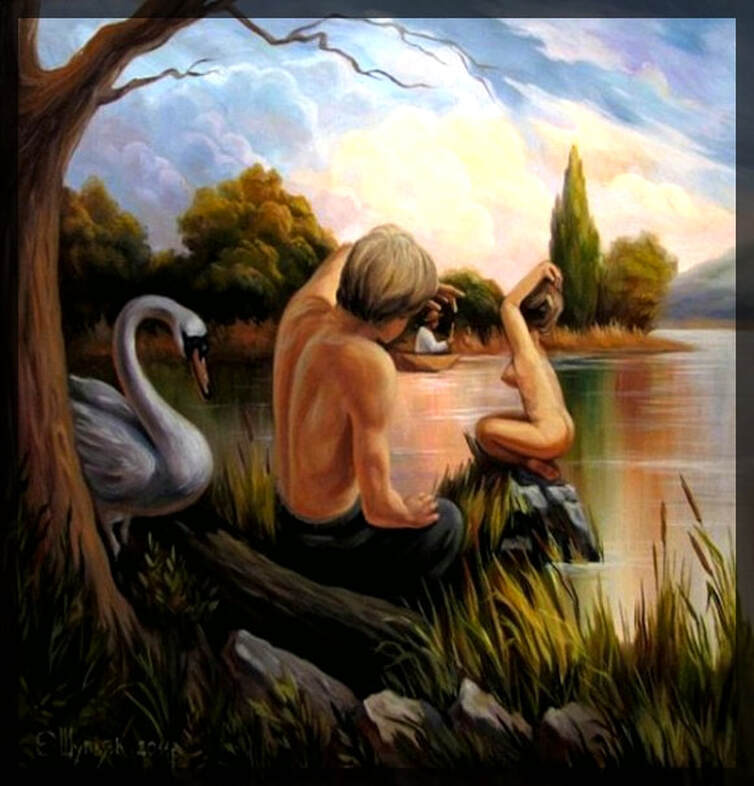WILLIAM BLAKE
& THE UNCONSCIOUS
.
by Michael Tsarion
|
|
I rest not from my great task! To open the eternal worlds, to open the immortal eyes of Man inwards into the worlds of thought: into eternity, ever expanding in the bosom of God, the Human Imagination - William Blake
|
There is no way to explain in one short article what the unconscious meant to a complex, insightful thinker like William Blake. Many books can be penned on the subject, and some already have been. A few authors look upon Blake as a proto-psychologist, doing their best to abstract from his Prophetic Books data corresponding to the central theories of later famous psychologists.
Certainly Adler's "Superior" and "Inferior" types can be traced to Blake, given that in his work opposites of this kind play a major part. His Zoas are forever warring with one another, struggling for supremacy over the psyche. In Blake, however, we find additional elements not dreamed of by Adler. In the conflict of the Zoas (hemispheres of the psyche) each Zoa is quite capable of introjecting and embodying antithetical aspects of their rivals. Urizen can at any time strengthen himself by embodying certain traits of his enemies Orc and Los. And why not, hints Blake. Can't reason and intellect be infused with emotional content, with feeling? Isn't emotion often directed by reason? Within one capacity of consciousness we find open portals to its opposite. How is this to be explained?
Certainly Adler's "Superior" and "Inferior" types can be traced to Blake, given that in his work opposites of this kind play a major part. His Zoas are forever warring with one another, struggling for supremacy over the psyche. In Blake, however, we find additional elements not dreamed of by Adler. In the conflict of the Zoas (hemispheres of the psyche) each Zoa is quite capable of introjecting and embodying antithetical aspects of their rivals. Urizen can at any time strengthen himself by embodying certain traits of his enemies Orc and Los. And why not, hints Blake. Can't reason and intellect be infused with emotional content, with feeling? Isn't emotion often directed by reason? Within one capacity of consciousness we find open portals to its opposite. How is this to be explained?
|
|
Austrian psychologist Alfred Adler (1870-1937). His belief in class struggle as the source of pathology was drawn from the scribblings of Karl Marx who built a dubious career for himself by defacing the profound works of Georg Hegel. Unlike Blake and Jung, Adler didn't factor in the deep internal conflicts besetting humans and why "Superior" types with "everything" still find themselves racked by psychological problems.
|
|
Certainly in Jung's corpus we come across many Blakean motifs. There are so many correspondences that one may surmise that Jung was more than familiar with the earlier sage's poetical works. One isn't far from the mark when describing Jung's schemata of Personality Types as a stripped-down rendition of Blake's infinitely more complex system. (Jung does cite Blake in passing in Psychological Types.)
The same can be said of Jung's so-called "Archetypes." A few sincere scholars admit that Blake was probably the chief source for the Jungian concept concerning the anatomy of consciousness. It's a vast study of which little can be said here.
Blake's Anima certainly isn't reduced to a single entity as she is in Jung. Far from it. The manifold aspects of femininity, both good and evil, are embodied by many female characters in Blake's psychodramas. We have figures such as Ahania, Enion, Enitharmon, Ololon, Vala and Jerusalem, with the last two being of supreme importance. These female counterparts of the Zoas are referred to by Blake as "Emanations." His work explores why divisions take place between masculine Zoas and their Emanations. Is it something inherent within the Zoa that forces a schism to occur, or narcissistic tendencies within the feminine polarity which causes the splitting and alienation of once united hemispheres? No two authors agree on the matter.
For readers of Jung it appears that there are approximately twelve or thirteen main Archetypes dominating consciousness. They can be easily divided into males and females, or at least into masculine and feminine characters. It works as long as we always remember the trusim that any particular woman contains within herself a masculine disposition, and that every man likewise possesses within himself a feminine side. One deals here with Personality Types rather than simple gender difference. Essentially, the Archetypes must find a working equipoise. This is true in Jung as it is in Blake. Indeed, even on the stereotypical level, each of us must find balance within, as well as as effective, productive interactivity with others. The microcosm must reciprocally interface with the macrocosm, the Self with the Other.
Blake and Jung both realized that there is in each person a dangerous inherent striving for the loss of identity in another person or larger social movement. Why this tendency exists preoccupied Blake. Like his contemporary, Hegel, Blake questioned what it is that drives us to selfless action, and why a man's chief method of self-discovery is facilitated by way of relationship. Moreover, are we eternally condemned to interact with others only in terms of a superior versus inferior or master versus slave dynamic? Blake struggled with this problem all his life, and thought more deeply on the matter than any other man.
The same can be said of Jung's so-called "Archetypes." A few sincere scholars admit that Blake was probably the chief source for the Jungian concept concerning the anatomy of consciousness. It's a vast study of which little can be said here.
Blake's Anima certainly isn't reduced to a single entity as she is in Jung. Far from it. The manifold aspects of femininity, both good and evil, are embodied by many female characters in Blake's psychodramas. We have figures such as Ahania, Enion, Enitharmon, Ololon, Vala and Jerusalem, with the last two being of supreme importance. These female counterparts of the Zoas are referred to by Blake as "Emanations." His work explores why divisions take place between masculine Zoas and their Emanations. Is it something inherent within the Zoa that forces a schism to occur, or narcissistic tendencies within the feminine polarity which causes the splitting and alienation of once united hemispheres? No two authors agree on the matter.
For readers of Jung it appears that there are approximately twelve or thirteen main Archetypes dominating consciousness. They can be easily divided into males and females, or at least into masculine and feminine characters. It works as long as we always remember the trusim that any particular woman contains within herself a masculine disposition, and that every man likewise possesses within himself a feminine side. One deals here with Personality Types rather than simple gender difference. Essentially, the Archetypes must find a working equipoise. This is true in Jung as it is in Blake. Indeed, even on the stereotypical level, each of us must find balance within, as well as as effective, productive interactivity with others. The microcosm must reciprocally interface with the macrocosm, the Self with the Other.
Blake and Jung both realized that there is in each person a dangerous inherent striving for the loss of identity in another person or larger social movement. Why this tendency exists preoccupied Blake. Like his contemporary, Hegel, Blake questioned what it is that drives us to selfless action, and why a man's chief method of self-discovery is facilitated by way of relationship. Moreover, are we eternally condemned to interact with others only in terms of a superior versus inferior or master versus slave dynamic? Blake struggled with this problem all his life, and thought more deeply on the matter than any other man.
|
|
Swiss psychologist Carl Gustav Jung (1875-1961). How much did he "borrow" from the insights of Blake? The concept of a "Shadow Self" originates with Blake, not Jung.
|
|
In Blake we find many more intriguing characters at play, once we add up the Zoas, Emanations, Shadows and Specters. In his book Vala or the Four Zoas even more characters appear, each representing the fragmented parts of a single psyche. A particular character can appear, for example, as the personification of a Zoa in an ignorant state; as old, blind or in some way stupified and diseased.
A Specter, for instance, often embodies the kind of calcified, intolerant, extroverted, hyper-aggressive form of masculinity left of a Zoa once his Emanation has broken away and fled. It's the kind of hardened toxic masculity we're familiar with today, that can so easily seize the reins of history at any moment.
Likewise, an alienated Emanation can exist as a weak, soft, passive, bitter, cruel, vampiristic entity, bent on leading her male counterparts to their doom.
It's not a case of one big happy family of all-knowing archetypal forms in Blake. Archetypes are not preoccupied with regaining a state of divine order. They are not necessarily attempting to restore harmony for all, although it sometimes appears that way. In fact, for Blake there is no longer any previously established order to reinstigate or return to. Those scholars who, for personal reasons, can't stomach this aspect of his vision, prefer to erroneously label him a Christian, Atheist or Gnostic, etc. Their pathetic attempts at classification do no justice to Blake.
Although the Zoas and Emanations resemble Jung's family of Archetypes, their behavior fosters imbalance and despotism. They are the cause of every form of unhealth imaginable.
In Vala or the Four Zoas, the Emanations appear, like the Zoas themselves, after the fall of Albion, who represents lost wholeness. Prior to Albion's fall into darkness, he embodied the only true God one can possibly know. In other words, Albion's essence is equivalent to Jung's "Self," sitting at the center of a radiant fourfold consciousness. Albion lost contact with his essence as any mortal in time and space may lose their core self. It is at this moment that eternity condenses into time, while space contracts to entrap the soul within invisible limits.
As Albion falls into a deep spiritual slumber, the shards of his once splendorous being covet lordship over the desolation that remains.
A Specter, for instance, often embodies the kind of calcified, intolerant, extroverted, hyper-aggressive form of masculinity left of a Zoa once his Emanation has broken away and fled. It's the kind of hardened toxic masculity we're familiar with today, that can so easily seize the reins of history at any moment.
Likewise, an alienated Emanation can exist as a weak, soft, passive, bitter, cruel, vampiristic entity, bent on leading her male counterparts to their doom.
It's not a case of one big happy family of all-knowing archetypal forms in Blake. Archetypes are not preoccupied with regaining a state of divine order. They are not necessarily attempting to restore harmony for all, although it sometimes appears that way. In fact, for Blake there is no longer any previously established order to reinstigate or return to. Those scholars who, for personal reasons, can't stomach this aspect of his vision, prefer to erroneously label him a Christian, Atheist or Gnostic, etc. Their pathetic attempts at classification do no justice to Blake.
Although the Zoas and Emanations resemble Jung's family of Archetypes, their behavior fosters imbalance and despotism. They are the cause of every form of unhealth imaginable.
In Vala or the Four Zoas, the Emanations appear, like the Zoas themselves, after the fall of Albion, who represents lost wholeness. Prior to Albion's fall into darkness, he embodied the only true God one can possibly know. In other words, Albion's essence is equivalent to Jung's "Self," sitting at the center of a radiant fourfold consciousness. Albion lost contact with his essence as any mortal in time and space may lose their core self. It is at this moment that eternity condenses into time, while space contracts to entrap the soul within invisible limits.
As Albion falls into a deep spiritual slumber, the shards of his once splendorous being covet lordship over the desolation that remains.
|
|
Blake's Prophetic Books include Vala or the Four Zoas, Milton and Jerusalem. Throughout his visionary writings, Blake reworked the material over and over. How could an all-knowing divine being fall into darkness? And how, from this state of infirmity and blindness can Spirit ever rise again to its former glory? Are the accounts of the many religions and other mystical traditions worth taking seriously, or must we adopt a wholly new perspective on the reasons for and results of the Fall? (Here for more...)
|
|
This brings us to Blake's idiosyncratic vision of the unconscious. It had both a positive and negative significance for him, and so did sleep.
In his mind, the Fall of Albion caused such spiritual exhaustion that man was destined for all eternity to rest his soul at night in sleep. Hence the healing effect of the unconscious. What little energy man retains from the time of his spiritual glory is sorely depleted in this realm of never-ending troubles - this age of iron and tears - as one busily goes round and round achieving nothing.
The infirm soul of man is perpetually directed by the blind, ignorant Zoas and Emanations, each of which further disturb the soul, draining it of vital energy. Let's do this and that...they each scream...so order will return. Actually, all that happens is that things get progressively worse. Blake had his eye on the advent both of religion and science in this regard. Both stand as evidence of spiritual paralysis. Both serve to forge the "manacles" imprisoning consciousness. He might have thought the same of psychology.
In his mind, the Fall of Albion caused such spiritual exhaustion that man was destined for all eternity to rest his soul at night in sleep. Hence the healing effect of the unconscious. What little energy man retains from the time of his spiritual glory is sorely depleted in this realm of never-ending troubles - this age of iron and tears - as one busily goes round and round achieving nothing.
The infirm soul of man is perpetually directed by the blind, ignorant Zoas and Emanations, each of which further disturb the soul, draining it of vital energy. Let's do this and that...they each scream...so order will return. Actually, all that happens is that things get progressively worse. Blake had his eye on the advent both of religion and science in this regard. Both stand as evidence of spiritual paralysis. Both serve to forge the "manacles" imprisoning consciousness. He might have thought the same of psychology.
|
|
Newton's Sleep, by William Blake, brilliantly illustrates the artist's contempt for religion and science. The scientist Newton represents those arrogant men attempting to master the mysteries of nature while sitting stark naked in the sludge of a deep ocean of ignorance, men such as Bacon, Newton, Locke and Hume, etc. Although he was an Idealist, Blake castigated other Idealist philosophers for not fully acknowledging and celebrating the supreme role and function of the human mind. Such a man is little better than the arch-materialist who reduces everything mental to "brain function." (Here for more...)
|
|
On the negative side, since sleep does relax and restore the soul, the psyche comes to overly rely on it. Sleep becomes the balm to calm distress. Since Albion can sleep away his existential problems, why ever confront them? Why muster the energy needed to overcome even small issues if one can simply turn away and ignore them? Is this tendency growing among the world's population? Are we leaving our direst problems in the hands of others instead of taking personal responsibility? Have we become pathologically dependent on priests and experts? Has Blake explained why they exist, and how they profit from our abnegation of responsibility? What else happens while we slumber in front of our big screen TV's?
Sleep, the ultimate restorative, eventually becomes another curse for man, thought Blake. What can be done? Not much. According to the poet we're standing on a precipice overlooking an even lower reality into which we can fall at any moment, personally and socially. That's right. We've fallen to this purgatorial realm, but are in dire straits of falling into even darker veils of ignorance and delusion. One look in most people's eyes today tells us that Blake knew what he was talking about.
Blake warned of how much precious time is wasted in sleep. He also warned that from the lowest and final state of fall there is absolutely no return. The inhabitant of this hades-like dimension cannot be saved because he has finally lost all trace of humanity. In an utterly materialized condition, he is incapable of rationally computing what's wrong with his life. Incapable of introspection and contemplation, it is simply impossible for him to look deeply at anything, including his own horrific existential degeneracy. His hell isn't experienced as hell. It's an ultra-feminized pseudo-reality completely to his liking, a product of what Blake called "Female Will." Every device of the Female Will must be experienced, understood and overcome before Albion awakens from his state of spiritual coma, and the Zoas transmuted and unified.
Among his many theories and illustrations of the unconscious mind, Blake portrayed the unconscious as both good and bad.
It is a "place" wherein we find the wreckage of the ancient devastated past. Memories of the ruination of a lost supernal state lie preserved there; of a broken, lightless dimension impossible to fathom and reconstruct. Reason fails in that desolation, and meaning can't be found among the twisted haunting shadows. The kind of fragile ego-consciousness we know now would completely collapse if a largely impenetrable veil hadn't been fashioned to separate conscious and unconscious worlds.
Jung seems at times to sympathize with this view. He is on record conceding that one's vision of the unconscious is almost entirely dependant on one's egoic perspective while approaching its mysteries. Apparently, one's conscious attitude determines what one experiences when it comes to unconscious content. Is this another way of saying that the unconscious is whatever one wants it to be? Is he saying that all perspectives are equally valid or invalid when it comes to the unconscious psyche? Are we to take from this that the unconscious is for the most part entirely perilous?
Sleep, the ultimate restorative, eventually becomes another curse for man, thought Blake. What can be done? Not much. According to the poet we're standing on a precipice overlooking an even lower reality into which we can fall at any moment, personally and socially. That's right. We've fallen to this purgatorial realm, but are in dire straits of falling into even darker veils of ignorance and delusion. One look in most people's eyes today tells us that Blake knew what he was talking about.
Blake warned of how much precious time is wasted in sleep. He also warned that from the lowest and final state of fall there is absolutely no return. The inhabitant of this hades-like dimension cannot be saved because he has finally lost all trace of humanity. In an utterly materialized condition, he is incapable of rationally computing what's wrong with his life. Incapable of introspection and contemplation, it is simply impossible for him to look deeply at anything, including his own horrific existential degeneracy. His hell isn't experienced as hell. It's an ultra-feminized pseudo-reality completely to his liking, a product of what Blake called "Female Will." Every device of the Female Will must be experienced, understood and overcome before Albion awakens from his state of spiritual coma, and the Zoas transmuted and unified.
Among his many theories and illustrations of the unconscious mind, Blake portrayed the unconscious as both good and bad.
It is a "place" wherein we find the wreckage of the ancient devastated past. Memories of the ruination of a lost supernal state lie preserved there; of a broken, lightless dimension impossible to fathom and reconstruct. Reason fails in that desolation, and meaning can't be found among the twisted haunting shadows. The kind of fragile ego-consciousness we know now would completely collapse if a largely impenetrable veil hadn't been fashioned to separate conscious and unconscious worlds.
Jung seems at times to sympathize with this view. He is on record conceding that one's vision of the unconscious is almost entirely dependant on one's egoic perspective while approaching its mysteries. Apparently, one's conscious attitude determines what one experiences when it comes to unconscious content. Is this another way of saying that the unconscious is whatever one wants it to be? Is he saying that all perspectives are equally valid or invalid when it comes to the unconscious psyche? Are we to take from this that the unconscious is for the most part entirely perilous?
|
|
After decades of thought on the subject, is our understanding about the nature of the "unconscious" any clearer? Does anyone know how and why the mind questions itself, and is a mystery to itself? Why do the "experts" differ when it comes to defining the unconscious? Is the "id" merely the repository of infantile pleasure-drives, or the sinister lair of man's rapacious inner "beast?"
|
|
Perhaps, had he lived, Blake might have found psychoanalysis a complete waste of time. Maybe he didn't want to be readjusted to an abnormal world, or be transformed into an obedient worker or smiling depressive.
He certainly may have objected to theories reducing human soul to "psyche," and castigated the breed of "Pavlovian" materialists purveying the nicely sanitized "pin it to a board" definition of the undefinable. Yes it's true that the word psych-ology means and implies "knowledge of the soul." But are we dealing with sleight-of-hand? Explaining away the mysteries of consciousness isn't the same thing as explaining them.
The "Doctor Stangeloves" at the helm of materialist science and philosophy relegated the soul to oblivion, putting "psyche" in its place as the central object of their particular kind of worship. The genuine article was replaced by the genuine fake, mysterious enough to pass for the "real thing" to everyone except Blake. He above all men understood what derangement lay behind such an irrational and fatal manoeuver.
Failing to acknowledge the soul or spirit of man, the servants of Urizen served an even more devilish purpose. Blake would have immediately seen that they were empowering the world's foremost evil presence - the priests. By rejecting the soul, European academics (such as Pavlov, Wundt, Pierce, Mead and others) left the subject in the hands of religion. For all the West's intellectual progress, the deadly influence of the vile "Black Robes" was kept firmly in place and even strengthened. Odd how the arch-materialist and theologian have benefitted so handsomely from each other's presence. It seems Kant's worries about religion's survival were all for nothing after all.
In any case, because of this problematic conflation of soul with "psyche," it's not clear whether Blake would have considered the unconscious, as described by mainstream lab-guys, to be of any real value. He was far more preoccupied with the present. According to the tireless artist and poet, it is the work we do in the here and now that sets the foundations of a new paradisal state. Adam takes birth in beauteous gardens planted today, not from those long decayed.
Blake most emphatically did not mean restore, reconfigure, reclaim or rebuild. No! These words denote the re-construction of something that once was. Blake most emphatically did not advocate such industry. This was not his perspective.
Instead of summoning unconscious forces, Blake's preference was always with art, imagination, creativity and hard work in real time. It is solely from these that a new holistic order arises, the means by which man discovers his true nature. The esssence of man is discovered in the living mirrors of the living present, not the dead past.
The Fall occurred so great learning might take place and spiritual (masculine) energy constituted anew. The lost self or soul is not rediscovered, but made or begun afresh. Nothing is gained raking over past debris. Consequently, for the deeply insightful Blake, there is little of value in what we call the unconscious. It has restorative value for fallen souls in a terribly depleted state, and provides a veil preventing frightful memories from disturbing the fragile kind of consciousness presently experienced. Why attribute other properties and qualities it does not actually possess? What heated conversations might Blake have had with Freud, Jung, Adler, Rank and other leading psychologists. We can but guess. The fiery Blake always enjoyed a good fistfight.
Perhaps this is why Jung was loath to cite Blake as an influence. For Jung the psyche's existence and function depends on the all-powerful entities known as Archetypes, which strive for psychic health and homeostasis. Blake preferred to see the Archetypes of the Collective Unconscious as responsible for maintaining a state of Fall. As said above, they continue to precipitate disaster, since our spiritual declination is by no means over and done with.
The unconscious is for Blake the evidence of previous collapse and failure. What's the point of taking it any other way? Searching the unconscious, or exalting it in importance, is the equivalent of entering a state of sleep, one serving only to calm a tearing, screaming child, as it were, allowing our misery-tossed souls to temporarily forget the harrowing effects and aftereffects of a fall from light into darkness, eternity into time, spirit into mortality.
Given that this is the case, Blake could have argued that death serves humanity as another kind of sleep. Given that our energy for life and all it demands is so constitutionally depleted and inadequate, maybe we subconsciously will death once we are physically and mentally exhausted. If it's not a absolute ending in spiritual terms, it may bring about the termination of our troubled experience of a world we failed to effectively negotiate, understand and master. In this respect we're all cast as blind inferior types, as Adler supposed. Who can know for sure? In any case, what can our destiny be in a world established by those in a state of ever-worsening spiritual delirium? What mad man holds the secret of how to put us right?
He certainly may have objected to theories reducing human soul to "psyche," and castigated the breed of "Pavlovian" materialists purveying the nicely sanitized "pin it to a board" definition of the undefinable. Yes it's true that the word psych-ology means and implies "knowledge of the soul." But are we dealing with sleight-of-hand? Explaining away the mysteries of consciousness isn't the same thing as explaining them.
The "Doctor Stangeloves" at the helm of materialist science and philosophy relegated the soul to oblivion, putting "psyche" in its place as the central object of their particular kind of worship. The genuine article was replaced by the genuine fake, mysterious enough to pass for the "real thing" to everyone except Blake. He above all men understood what derangement lay behind such an irrational and fatal manoeuver.
Failing to acknowledge the soul or spirit of man, the servants of Urizen served an even more devilish purpose. Blake would have immediately seen that they were empowering the world's foremost evil presence - the priests. By rejecting the soul, European academics (such as Pavlov, Wundt, Pierce, Mead and others) left the subject in the hands of religion. For all the West's intellectual progress, the deadly influence of the vile "Black Robes" was kept firmly in place and even strengthened. Odd how the arch-materialist and theologian have benefitted so handsomely from each other's presence. It seems Kant's worries about religion's survival were all for nothing after all.
In any case, because of this problematic conflation of soul with "psyche," it's not clear whether Blake would have considered the unconscious, as described by mainstream lab-guys, to be of any real value. He was far more preoccupied with the present. According to the tireless artist and poet, it is the work we do in the here and now that sets the foundations of a new paradisal state. Adam takes birth in beauteous gardens planted today, not from those long decayed.
Blake most emphatically did not mean restore, reconfigure, reclaim or rebuild. No! These words denote the re-construction of something that once was. Blake most emphatically did not advocate such industry. This was not his perspective.
Instead of summoning unconscious forces, Blake's preference was always with art, imagination, creativity and hard work in real time. It is solely from these that a new holistic order arises, the means by which man discovers his true nature. The esssence of man is discovered in the living mirrors of the living present, not the dead past.
The Fall occurred so great learning might take place and spiritual (masculine) energy constituted anew. The lost self or soul is not rediscovered, but made or begun afresh. Nothing is gained raking over past debris. Consequently, for the deeply insightful Blake, there is little of value in what we call the unconscious. It has restorative value for fallen souls in a terribly depleted state, and provides a veil preventing frightful memories from disturbing the fragile kind of consciousness presently experienced. Why attribute other properties and qualities it does not actually possess? What heated conversations might Blake have had with Freud, Jung, Adler, Rank and other leading psychologists. We can but guess. The fiery Blake always enjoyed a good fistfight.
Perhaps this is why Jung was loath to cite Blake as an influence. For Jung the psyche's existence and function depends on the all-powerful entities known as Archetypes, which strive for psychic health and homeostasis. Blake preferred to see the Archetypes of the Collective Unconscious as responsible for maintaining a state of Fall. As said above, they continue to precipitate disaster, since our spiritual declination is by no means over and done with.
The unconscious is for Blake the evidence of previous collapse and failure. What's the point of taking it any other way? Searching the unconscious, or exalting it in importance, is the equivalent of entering a state of sleep, one serving only to calm a tearing, screaming child, as it were, allowing our misery-tossed souls to temporarily forget the harrowing effects and aftereffects of a fall from light into darkness, eternity into time, spirit into mortality.
Given that this is the case, Blake could have argued that death serves humanity as another kind of sleep. Given that our energy for life and all it demands is so constitutionally depleted and inadequate, maybe we subconsciously will death once we are physically and mentally exhausted. If it's not a absolute ending in spiritual terms, it may bring about the termination of our troubled experience of a world we failed to effectively negotiate, understand and master. In this respect we're all cast as blind inferior types, as Adler supposed. Who can know for sure? In any case, what can our destiny be in a world established by those in a state of ever-worsening spiritual delirium? What mad man holds the secret of how to put us right?
. . .
Michael Tsarion (2021)
Michael Tsarion (2021)
